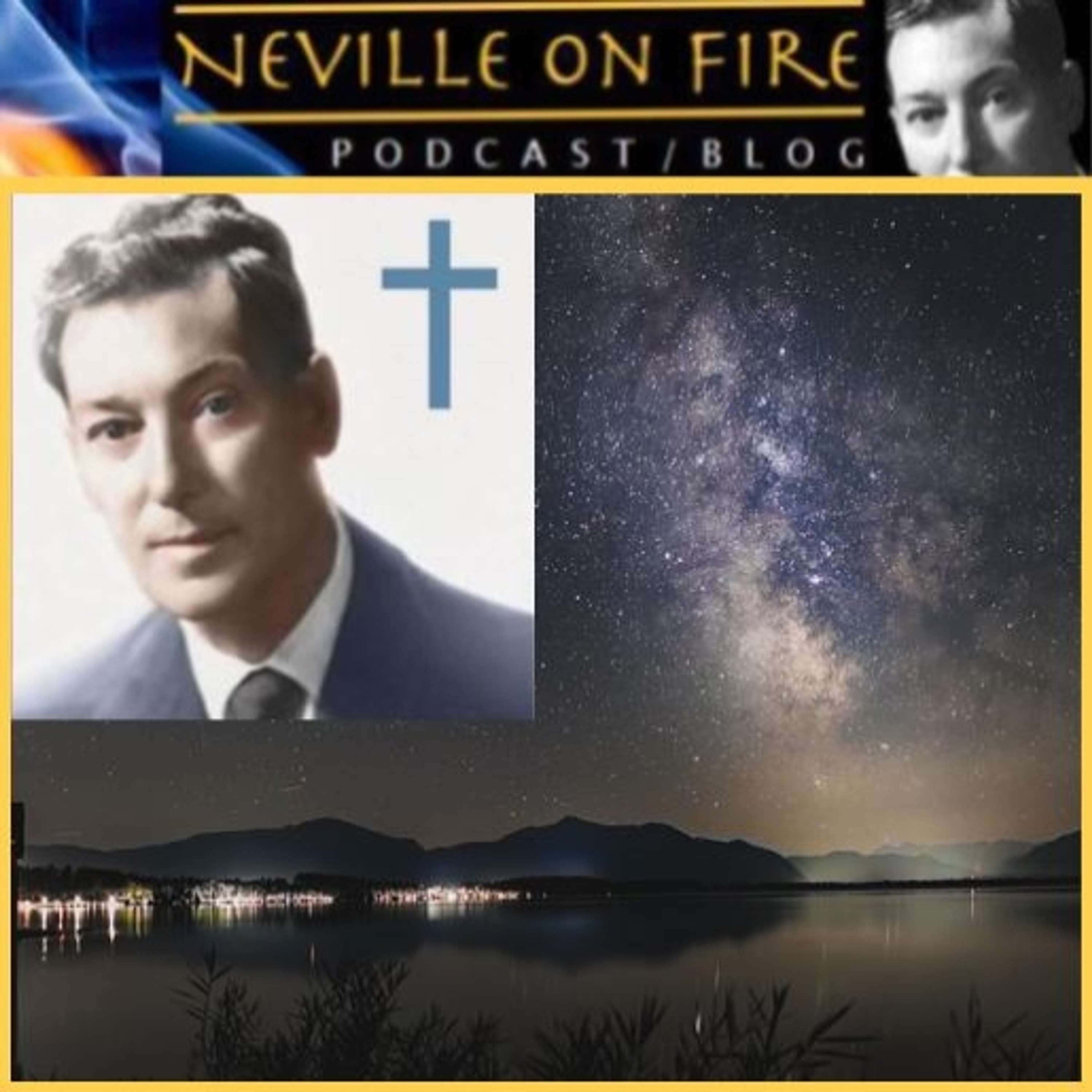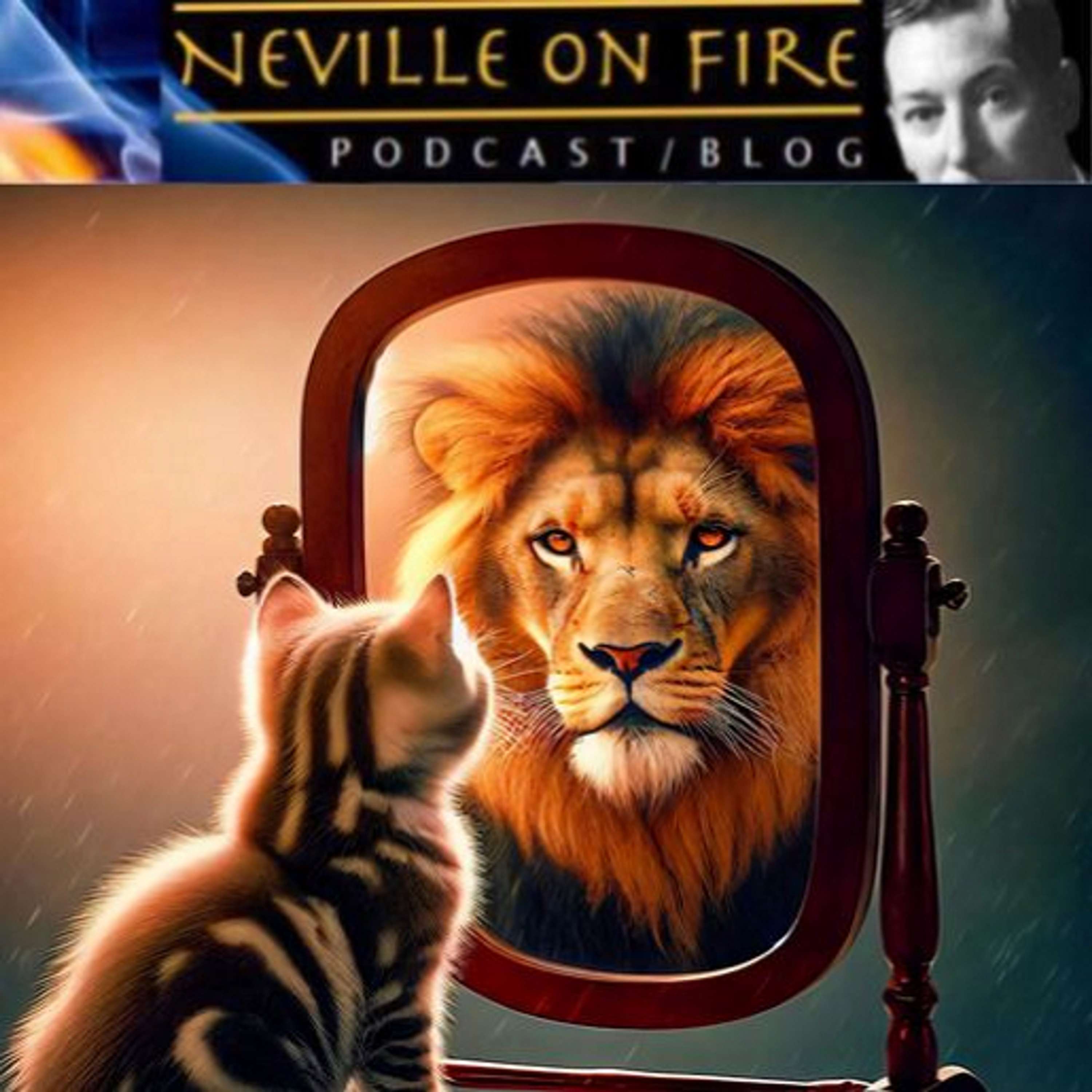Show Notes
Introduction
I did not post in the last 2 weeks. Discussion of illness.
1. Planet in its orbit - proximity to and remoteness from conscious source, as a test.
2. Subtlety, refinement of state is desirable.
3. Put off the old mental conversations.
4. Helpful image of the serpent.
5. Blake: died many times since. Maurice Nicoll explains the seeming flatness and nothing to fall back on.
6. Sedona Method: releasing; letting go.
7. Where does the method lead?
- From having to wanting to being.
- Premature, artificial development is never a good thing (Alexander).
- Neville’s natural progression: accepting desire and wishes as expressions of one’s state.
8. Summary: Need for a careful consideration of one’s worldview, one’s definite chief aim, and honesty with oneself about level of development.
KEY QUOTE
“There seems to be nothing to fall back on. What we actually lose is the ordinary feeling of ourselves.” (Nicoll, M. Living Time p. 75)
RESOURCES
Neville, Seedtime and Harvest, Chapter Seven.
Sedona Method Release Technique 1992, series of 8 videos
Repeated:
Maurice Nicoll (1952) Living Time and the Integration of the Life
mp3 download - Neville Mental Diets
Alexander, Dr. Rolf (1956) Creative Realism
Show Transcript
E13
[edited for clarity]
This is episode 13, Many Ways to Die.
In the past few weeks, I did not post, I was experiencing some illness. I was disappointed by that. It showed me that you can experience something and still not necessarily really believe it. Somehow we have to go through human experience and even the body itself and all of its difficulties -- I still maintain and believe -- that they're a psychological emanation. Somehow we seem to be bound up in conditions that are absolutes, that are not controllable, and yet ultimately things still are psychological or mental in nature.
I would say that I do not submit to the stone throwing by other people who would say, see, you succumb to this, you succumb to that and you didn't believe it. Well, I still don't believe it. I do believe that I'm going through a human experience and therefore I'm being subjected to tests, and it's necessary to maintain mental discipline, the discipline denial that we talked about back in E5. Another way to say that is to say, well, we have various experiences, but it's the response to it's, the mental reaction to the experiences that constructs your reality.
There was an event in the news going back several months, perhaps a few years that one of my family members told me about. It was a woman who had cancer and she decided to commit suicide. So she jumped off the back of a ferry into icy, freezing cold waters and in the subsequent hours did not die, but actually eventually responded to search boats who were going around looking for her with search lights, because somehow she felt compassion towards their endeavor to try to save her. When she got back to land and was checked out, she discovered that all of her cancer was gone. And my family member said to me, I don't understand this, can you explain it? And I didn't know anything about the case. I hadn't even read about it, but I immediately just said, it seems like she just died to herself. That aspect of her that was cancer ridden simply disappeared from her psyche. So with that as an intro, let's explore several points along the lines of many ways to die.
1. Going back to my recent experience... A planet, when it goes around the sun has an elliptical orbit. And part of that orbit brings it closer in proximity to the sun, to its life source, to the source of its ideas, its warmth, its life. And yet at the far edge of its elliptical orbit, it's going to be experiencing relative darkness. That seems to be what happens to us. So you can go through an experience and you find yourself in a situation where all of your previous ideas, everything that you thought you had built up, everything that you thought you understood is removed from you. And then it's like a test. Okay, where are you now? So you have to remember at that point that everything is simply a psychological state. And once that point is realized and understood, then you can make your way back.
2. The second point I want to discuss is to point out that everything that I've been presenting in terms of ideas, methods, techniques, Neville's worldview, and so on, they're all indications, sort of reference points or suggestions that necessarily have to come down to personal interpretation, personal experience -- keeping in mind that there's going to be differences necessarily in our personal disposition, our personality type, our approach, our use of language. And what we're looking for is a certain refinement, subtlety and level of truth that each one of us experiences on an individual basis.
3. Put off the old man, which is corrupt. This is discussed by Neville in many places, but notably in his lecture called Mental Diets, which I've referred to before. Always worth relistening to that one. Now this is one way to die to oneself, to put off these old conversations which are so musty and dusty, they aren't even necessarily negative in character. They could just be mechanical repetitions of things that are bordering on the absurd or on the insane -- if you look at it -- and these are the things in the odd moments during the day that you simply put off. Put your attention onto the new thing, the thing that is desirable, the track of conversation that reflects the wish fulfilled. So I will put a link in the show notes to Mental Diets, just in case you haven't heard that one.
4. The imagery of the serpent. Now here is where Neville makes another brilliant interpretive coup. He takes the serpent, of course, the symbol of evil. And so many stories are spun around that and misunderstood. Neville turns it right around and says, no, the symbol of the serpent is actually a positive thing, something to learn from. Now here I'm quoting from chapter seven of Seed Time and Harvest: “The serpent's ability to form its skin by ossifying a portion of itself and its skill in shedding each skin as it outgrew it caused man to regard this reptile as a symbol of the power of endless growth and self reproduction.”
So let's go back to the experience of being far out in the elliptical orbit, away from your center of consciousness and inspiration -- and feeling down in the dumps or even experiencing illness. Well, Neville's answer is again from the same chapter: “The spiritual body of imagination is not interlocked with man's environment. In other words, with his body itself. The spiritual body can withdraw from the outer man of sense and environment and imagine itself to be what it wants to be. And if it remains faithful to the vision, imagination will build for man a new environment in which to live. And this is what is meant by the statement, I go to prepare a place for you...”
So to take the widest possible view, we don't die, we can't die. We are life itself that is continually in the process of transformation. And here in the very same chapter, Neville gives another quote: “Man is immortal, therefore he must die endlessly, for life is a creative idea, and it can only find itself in changing forms.”
5. Just recalling a quote from Blake wherein he said (and I mentioned this in a previous episode): I was born in such and such a year, and I've died many times since. He was referring obviously to his psychological death, which has to be undertaken many times during a lifetime. And I think in that same episode I mentioned that this can result in sort of a strange feeling of flatness or emptiness, which seems very unexpected. Well, there's a good description of this experience in Maurice Nicoll from his book Living Time. So I'll read to you right now, the whole passage:
“Momentary changes sometimes occur. They indicate to us there are other States of oneself. And while they last, one has changed through a new feeling of oneself. All change in oneself comes through a changed feeling of oneself. We have what can be called a natural reality in which we dwell. We move in a small orbit of meanings of notions about ourselves, others, and the world. If this orbit is broken, we are usually in a peculiarly helpless condition, having no idea of anything else. There seems to be nothing to fall back upon. What we actually lose is the ordinary feeling of ourselves. So we become frightened and lost, not so much because of what has happened, but because we cannot recognize ourselves.”
6. The Sedona method. I'm referring to the Sedona Method, that is a reference to Sedona, Arizona, where this method was promulgated and sold to groups of participants, which I discovered fairly recently. You may have heard of it. It has to do with releasing emotions, releasing or letting go. The reason I'm bringing it up is because in the first several points I've been talking about the experience of psychological death, small deaths, changing of one state into an unfamiliar territory within oneself. Now, to the discussion of all the methods and techniques, including the difficulties that we talked about in E3, we can add this technique, which is particularly effective in releasing certain core difficulties that come up time and again.
You may discover that through all the admonitions that we might follow from Neville to focus on the good, focus on what we do want, there still seems to be nagging subconscious habits that rise up and challenge us. So the Sedona Method is particularly effective in meeting those head on. And instead of removing your attention from them, as we normally suggest, what we want to do is stay with them and move through them. So I'll give you a reference to a series of tapes, videotaped sessions from the Sedona Method. You'll just look past the fact that it's dated, that the hairstyles are dated, it comes from the 90s, the quality of the tape is dated, sometimes the audio and the video doesn't match up very well -- I trust that you all see past all of those things to get to the core of the matter, which is the actual method itself.
7. The question then arises, where does the Sedona Method lead to? What is your ultimate goal?
In the whole context of the method as it's presented by its creators the whole thing leads eventually to enlightenment. It has to do with the ultimate release and acceptance, into love, and so on. And it's really your personal choice as to what it is that you want to build. Do you feel as if you're more in the world, you're still in the world of having things, you want to have things, or you're in the world of doing things, you want to accomplish things? Or is it indeed the fact that you really want to die to all of these various aspects of yourself and move to being this to the highest possible level? Well, I bring up the Sedona Method, as I said, because it can be particularly helpful for sort of acute difficulties that you may be experiencing a way to release and get through them. And the ultimate goal, the only commentary that I really have on that score is to say that premature development is never a good thing.
And there I'm quoting from Rolf Alexander: Premature development is never a good thing. In other words, I can really appreciate Neville's approach to desire to levels of development. He never skips over anything. He simply accepts whatever your desire is, whatever your wish is, as a result of the state in which you find yourself. This leads to a sort of a natural progression.
Now in the Sedona Method itself, they talk about releasing not just the negative unwanted emotions, but actually releasing the positive ones, releasing your desire, releasing what you think you want. Not that having is a bad thing, as they point out, but it's the hook, the attachment to the desire, that is the undesirable thing, according to them. So there's nothing wrong in that approach either. It's simply a matter of where you are and what you want. But in repeating this idea that premature development, artificial development is never a good thing, I can tell you I've witnessed this, where someone moved beyond having-ness, beyond doing-ness, and went straight into being-ness at a young age. And became incredibly accomplished at being. And yet it was quite clear that the earlier aspects of development should have been looked after, because they came back to recapture, reclaim this person's consciousness, and in a sense corrupt and ruin psychological development.
8. I want to summarize then this whole idea of where a method leads. We can see that on the one hand, you could release -- and release not only negative emotions but even desire itself, until you get to, say, a point of flatness or emotional coldness. To Nicoll’s point, you don't actually even recognize yourself. Now that is a vulnerable position, because if you don't recognize yourself, it's not a bad thing to experience sort of an emptiness or a release in itself. But if there's nothing intentional in mind to come in and build something, to replace it with what you do actually want on a higher level, on a higher scale, then you're simply going to be open to all of the old responses, all of the old man, the old conditioned responses and subconscious ideas that will rush in to fill the gap.
Therefore, it's necessary to be vigilant when you're releasing and to understand where you want to go, what it is you're trying to build. So there's, I think, a very subtle interaction there where you don't want to be too identified, you don't want to be too wrapped up in your own ideas and so on, and you do want to release. And yet if you find yourself in a position of blankness, emptiness and flatness, realize that you could be opening yourself up to something that you actually don't ultimately want. And then the second point that I'm trying to make here is that to go artificially beyond the idea of having-ness or doing-ness, accomplishing things, and going straight into the highest level of being-ness in an artificial way, in a dishonest way, where you're not really recognizing what your own desires truly are, then that is the other pitfall.
And so just to reiterate, that's why I appreciate Neville's approach so much, because, while he doesn't limit the possibility, and he wants people to have an ultimate transformation, he doesn't rush the matter. He simply accepts on behalf of each and every student the occurrence of their desire and their wish, as a natural expression of their state, and part of a natural progression in their development.
Summary
Well, to summarize the points in today's episode, you could consider yourself as a planet in orbit, an elliptical orbit, and at times you may find yourself so far removed from your conscious inspiration, from your conscious source, from all the ideas and good things that you thought you had built up. But remember, that is a test. It's something where you simply must remember that everything is a state of mind. Once you remember that, you can find your way back.
The second point is that a subtlety, a refinement is what we're all after. So that we truly understand and make our own these various ideas.
The third thing is to put off the old man, to put off the old conversations, and the best source for that that I can think of is Mental Diets by Neville.
The fourth point was the image of the serpent which, as Neville so often does, he rescues a negative image and presents it in a positive transformative light, so that we can actually put off the old ossified parts of ourselves psychologically and adopt the new.
The fifth point was the quote from Blake that he died many, many times. This is what's necessary in a reflective life! You can't remain the same and change. We talked about the quote from Nicoll where he says you could find yourself in a very strange unfamiliar state. And then from there we went to the Sedona method.
Point number six was how to release particularly difficult aspects. Then we finished off in points seven and eight with the idea of considering carefully where this method leads, and what your goals are -- and not to either fall into the trap of letting the bad things come rushing back in to fill a vacant space; nor should you fall into the trap of rushing artificially to some sort of premature development that is really being dishonest with oneself.
Simply accept -- and release if you need to -- but don't jump over the natural desires that occur and arise within you [assuming we follow the golden rule] as a result of your natural progression from one state to the next.
Listen On
Also Listen
-

Who is Man? Neville’s Radical Answer
Book draft chapter 1. S1E01 revised, inviting your comments.https://nevilleonfir -

The Power of Noticing: How to Interrupt Mechanical Life
Conscious intervention is required for psychological growth. -

Let Go to Move Ahead: Neville and Sedona
First, review of first 15 episodes Season 2. Then explore incremental psychologi -

Conscious Self Persuasion
Science tries to define consciousness where it does not exist, and hypnosis whil


Comments & Upvotes